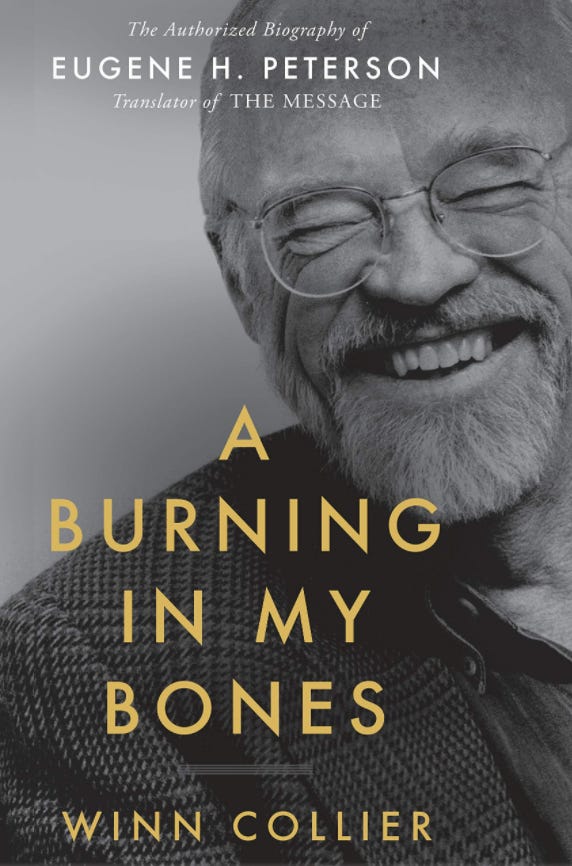A Burning in My Bones: Rest
Some people have the energy of a dozen bodies, never seem to tire, never seem to in need of getting away for more than a week or two, never need an extended retreat or a sabbatical.
But not many.
Extroverts gain energy from people while introverts are sapped by people. Many pastors are introverts who work well with people but need down time, away time, quiet time, alone time. Those who manage the balance well do well. Those for whom the people are too demanding need longer periods away to recover.
Photo by Ales Maze on Unsplash
In the patterns of a vocation there are ups and downs, dry spells, dark nights, sleepless weeks, and need to get away, to lock the office door, to put it all out of mind and find refreshment.
Many churches can’t afford paying a pastor to go on sabbatical or the associate is not ready to handle all the decisions. Some pastors need a sabbatical, the church can afford it, but the pastor can’t surrender control and decisions.
Eugene Peterson was a pastor in need of a rest, his church didn’t have the money, but a friend paid for a year sabbatical for him. We are looking at Winn Collier’s biography of Eugene Peterson, A Burning in My Bones (pp. 169-195; for the reading plan).
He found himself in that sabbatical as many of us have found in a getaway renewal, joy, and a fresh vision for our calling.
His away time was time to think, pray, read, and write.
What about you: What are your patterns for rest? Does your church have a sabbatical policy? Do you and your work sync when it comes to what you need?
Collier tells a story about finding “weeds in the garden,” an image of problems. One evening he spent an hour locked in the church yelling and shouting and praying to God: Psalm 24 and 114, some tongues, some Yahweh Elohim, some chant.
It was in this period that he wrote some of Working the Angles, one of his best books. When I wrote Pastor Paul, I read most of Peterson’s pastor-facing books and found myself “amen-ing” and “quoting” and “citing” and, well, I had to stop the quoting and citing and delete some of them but I resonated over and over with Peterson. I have tired of the platform preacher out to create a bigger and bigger audience who doesn’t pastor people. One time in a conversation with a pastor who knew one of America’s most famous pastors, the pastor told me that “So and so only goes to church on Sunday for the sermons. The rest of the week he’s at home preparing. He has no idea what goes on in the everyday work of the church and doesn’t pastor anyone.” An extreme, to be sure, but frankly an extreme many think they’d like. I like Peterson.
He liked his sabbatical. He discovered the life of a writer. He finished Working the Angles and began his wonderful little book on Revelation, Reversed Thunder. Then wrote Answering God.
They returned to Maryland (Bel Air) knowing their challenge: to be Christians in the midst of a parish. In one prayer he wrote down he told God he didn’t want to be a pastor any longer and hours later he told God he was “so glad I’m a pastor”! Sabbaticals, friends, don’t prepare most people to return. They prepare more of us to retire. It feels like the kingdom of God at times!
Some thought he was a “cold fish” and that his books were great but not so much in person. Ah, there it is: author persona vs. real person. Impossible to avoid but an important reminder.
An observation, correct me if I’m wrong. I’ve been told by a number of people that Jan was the pastor of the people, not Eugene. Collier’s book often enough speaks of Peterson’s presence with the people.
A fact about Peterson: he felt his books were more effective than his sermons.
He was beginning to think of retirement. See what I mean when I say sabbaticals prepare many more for retirement than return. What he envisioned was retiring from pastoring so he could retire to the work of writing.
He struggled with how others were getting the attention, the very ones he thought were corrupting the pastorate. He was in “exile” in Bel Air Maryland pastoring a church no one took for the paradigm.
One of the most important statements he ever made Collier finds in the journal:
I’m about to be dogmatic on one detail in this: good, authentic, pastoral work-the working out of vocational holiness-cannot be done in a large congregation. It re-quires a small community. “Big” introduces dynamics and perceptions that destroy intimacies. I am willing to concede occasional exceptions-but only in exceptions-never as models. We must repudiate the desirability of the large congregation and the so-called professional staff. 500 is top number.
You wouldn’t be the first one to wonder how financially susustainable the small church model is, but you might be asking the question that might have other answers.




What I think is so interesting about the journal entry at the end of the post today, is that he is dogmatic and there seems to be little, if any, doubt in what he's saying; small is better than big. While Eugene struggled with aspects of pastoring, he appears certain about church size. I also think about how unpopular those statements were during the time he was a pastor, especially the later years, as churches grew bigger and bigger. It also makes me think about how a pastor functions much differently in a big church versus a small church. The pastor of a big church has to be much more focused on sermon delivery and the pastor of a small church has to be much more relational. It seems like it's pretty clear what church attendees have come to desire in America (although I think things might be shifting a little bit.)
Concerning rest, I don't work for a church, but I do work in HR and think about the way we work quite a bit. Rest is not something we seem to value, but it's essential to our work. It's a difficult and complex conversation to have when productivity is valued so much more than rest and recovery. I think we draw a lot of our worth as humans by how much work we can put out into the world, and the effects of that kind of thinking eventually wear us down.
I resonate with this so very much. On multiple levels. I pastor an extremely small church working among the poor and homeless. It is a great challenge on many levels. We have major financial challenges. It struggles to be self-sustaining. The work is hard and. Halle going for families used to middle-class churches - not ones where homeless strangers, sometimes high or hungover, walk in Sunday’s to our rented assembly hall. During Covid my pay was down a huge amount. But somehow we are still surviving through gifts of friends. I’ve never had a sabbatical in 30+ years of ministry and doubt I will have a retirement. I have felt that desire to stop pastoring many times - but then what? What is interesting about Peterson’s comment is that just two days ago I spent 3 hours counseling a young man who said he could not go to a mega church here in town because he can’t imagine just watching a pastor on a big screen and with whom he will never interact. “I am actually sitting here talking to the pastor for an entire morning! And I can do this on a pretty regular basis. This would never happen in one of these larger churches.” Out church, small as it is, has touched many lives among the homeless and impoverished in our community - even in our own poverty - not through large $$ poured into grand services offered; but through personal interaction with people. It really is about that. But it is very difficult to sustain, financially and emotionally.